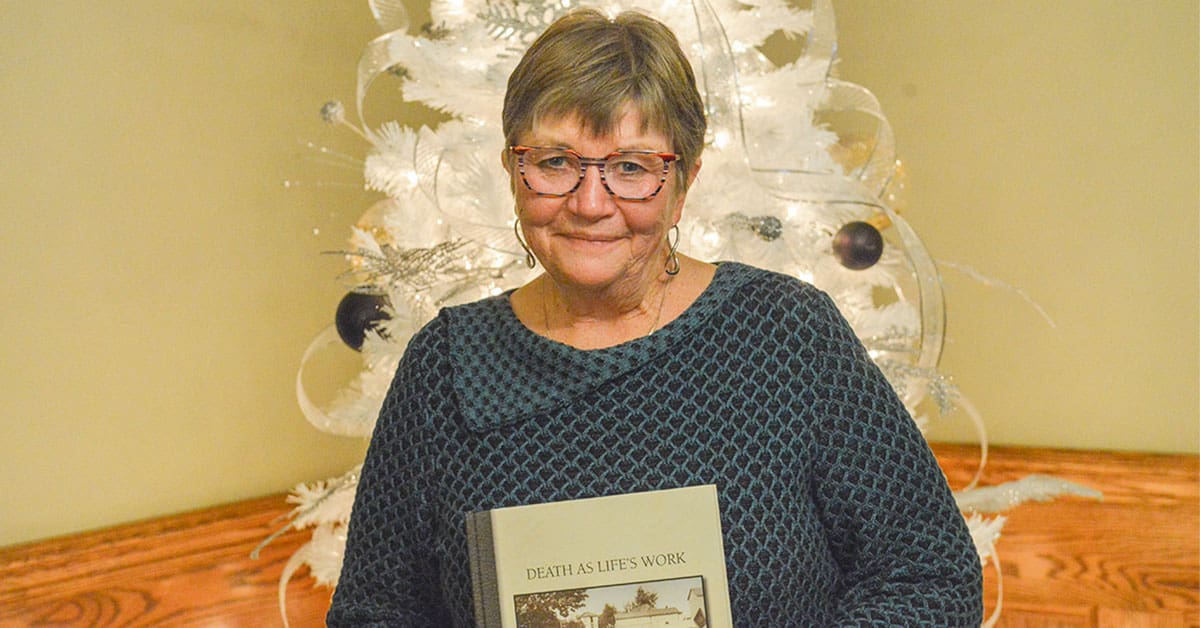Local historian and author Marion Roes’ new book started with her curiosity about her own family story, which includes being the one-time owners of the Dreisinger Funeral Home in Elmira. After discovering old photographs, she began doing more research about some of the older funeral homes in the area, most of which have been passed down through generations.
It’s not the most glamorous business, but these are the people that are there for families during an often-confusing time, and many families appreciate the help, noted Roes.
“Most people in the area will know some of them in the book because 99 per cent of people deal with a funeral home. So, it’s partly to tell them (readers) ‘these are the people who look after your loved ones and yourself,’ because a lot of people don’t think funeral directors are real people. A lot of people don’t like going to the funeral home, which is understandable, but this kind of gives them a broader picture of what goes on at the funeral home and what people are like.”
She started writing the book, ‘Death as Life’s Work,’ in 2014 while working on another research project. Roes gathered so much material, the idea instantly came to her to turn it into a novel, one she hopes the region will enjoy as it unveils some local history.
“It’s history, it’s not like the nitty-gritty part of the funeral business – it’s about local history and all of Waterloo Region. There’s people in there from all over Waterloo Region.”
Interviewing more than 30 people who work in the business, Roes was able to collect stories and history that she added into the book, happy to have her fellow historians interested in the project. Through newspaper clippings and ads from 1850 to now, she was able to learn quite a bit about the unique services.
“Fellow historians and friends knew what I was researching, and they gave me a ton of pictures, leads of people to interview, especially funeral directors. The book would be a lot smaller if I hadn’t had that input from other people. It’s geared towards researchers of family history, genealogy, funeral business history because there is pretty much not another book like it.
“When you read through it, you’ll see how some things changed, like the telephone service, that kind of thing,” said Roes.
“Dreisinger’s is the largest section because I had a lot of material because it was my family funeral home, so I have a lot of records and material. I think there’s probably about 140 businesses or people in the book; some people there’s a page on them that’s all and others there might be 10, some might have 15, some might have 20, depends how much information I could find. Some of the reasons why they got into the business were similar: they had an experience with a loved one that had died, usually when they were younger and they admired the way the funeral director worked with the family and wanted to get into that business. And most of them the reason they stayed in it, it’s a passion for them, it’s like a calling. You can’t do some of the kind of work unless you really believe in what you’re doing and you can serve families and help them at a difficult time. Not everybody can do that,” she said.
A lot of them were funeral directors in the 50s and 60s, because I interviewed a lot of older ones and they talked about the telephone service and how it changed because they had to be in their buildings 24/7 because there weren’t answering services for a while. ”
Upon stumbling on an old photograph of the Dreisinger Funeral Home, she learned quickly more information about her family’s history, wanting to learn even more she delved deeper into the subject.
“It was part of my upbringing, so I was always aware of the business. To me it wasn’t an interesting bit of information, that was just how it was for the family members who worked there. My sister is in her 53rd year as a funeral director. My mother was a Dresinger but then she was married and now we have different names. It was my great-grandfather, then his son, then his two children and then there were two children from the next generation that worked in the funeral home. It started in 1904 and the Dresingers owned it until 2009,” said Roes about the family history that inspired her to write ‘Death as Life’s Work.’
A fellow historian helped her identify the make, model, and year of some of the vehicles in the photos she gathered, helping create a better overall image of what that time period was like and how vehicles used in a service have changed.
“The one on the cover is the most interesting. It’s the Salvation Army band leading a funeral, walking to the cemetery from the church; probably that’s 1915, and the one family I interviewed, that was their grandfather in one of the vehicles. When I saw that, I thought ‘that’s the perfect one for the cover.’”
The new books by Roes are currently being sold locally at Living Waters in Elmira, Wordsworth in Waterloo, the KW Bookstore in Kitchener and Futher-Franklin Funeral Home in Wellesley.
“I’ve written a few other smaller books, not like this. It became a lot bigger; I had no idea I’d find the information that I found. One of the reasons I started it was because I was looking for information about my great-grandfather’s business in Waterloo and Kitchener. I decided to do the whole region because I didn’t think I would find that much information. I looked through a lot in newspapers, mostly the Elmira papers, and Kitchener and a bit of Cambridge, going to archives – a lot of it was newspapers.”
If anyone has any questions or more information, they can contact Roes on her email at mlroes@sympatico.ca . Anyone looking to see more photographs from back then can follow Roes’ Facebook group called Undertakers and Their Businesses in Waterloo Region.









